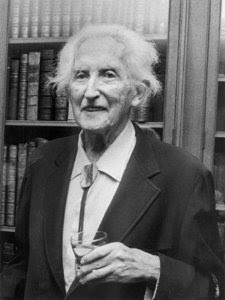Erik Erikson, the psychologist who re-envisioned the human life cycle as a series of developmental stages, described the "identity crisis," and popularized the genre of psychobiography with his books on Martin Luther and Mohandas Gandhi, would have been 100 years old on June 15. From 1960 to 1970, Erikson taught at Harvard as professor of human development and lecturer in psychiatry. His undergraduate course, "The Human Life Cycle," was one of the most popular at the College. Erikson died in 1994 at the age of 91.
Erikson's psychosocial development theory
Erik erikson's psychosocial crisis life cycle model - the eight stages of human development
Erikson's model of psychosocial development is a very significant, highly regarded and meaningful concept.
Life is a serious of lessons and challenges which help us to grow. Erikson's wonderful theory helps to tell us why.
The theory is helpful for child development, and adults too.
For the 'lite' version, here's a quick diagram and summary. Extra details follow the initial overview.
For more information than appears on this page, read Erikson's books; he was an award-winning writer and this review does not convey the richness of Erikson's own explanations. It's also interesting to see how his ideas develop over time, perhaps aided by his own journey through the 'psychosocial crisis' stages model that underpinned his work.
Erik Erikson first published his eight stage theory of human development in his 1950 book Childhood and Society. The chapter featuring the model was titled 'The Eight Ages of Man'. He expanded and refined his theory in later books and revisions, notably: Identity and the Life Cycle (1959); Insight and Responsibility (1964); The Life Cycle Completed: A Review (1982, revised 1996 by Joan Erikson); and Vital Involvement in Old Age (1989). Erikson's biography lists more books.
Various terms are used to describe Erikson's model, for example Erikson's biopsychosocial or bio-psycho-social theory (bio refers to biological, which in this context means life); Erikson's human development cycle or life cycle, and variations of these. All refer to the same eight stages psychosocial theory, it being Erikson's most distinct work and remarkable model. The word 'psychosocial' is Erikson's term, effectively from the words psychological (mind) and social (relationships). Erikson believed that his psychosocial principle is genetically inevitable in shaping human development. It occurs in all people.He also referred to his theory as 'epigenesis' and the 'epigenetic principle', which signified the concept's relevance to evolution (past and future) and genetics. Erikson explained his use of the word 'epigenesis' thus: "...epi can mean 'above' in space as well as 'before' in time, and in connection with genesis can well represent the space-time nature of all development..." (from Vital Involvement in Old Age, 1989).
Erik Erikson's eight stages of psychosocial development
Like other seminal concepts, Erikson's model is simple and elegant, yet very sophisticated. The theory is a basis for broad or complex discussion and analysis of personality and behaviour, and also for understanding and for facilitating personal development - of self and others.
The main elements of the theory covered in this explanation are:
- Erikson theory overview - a diagram and concise explanation of the main features of model.
- The Freudian stages of psychosexual development, which influenced Erikson's approach to the psychosocial model.
- Erikson's 'psychosocial crises' (or crisis stages) - meanings and interpretations.
- 'Basic virtues' (basic strengths) - the potential positive outcomes arising from each of the crisis stages.
- 'Maladapations' and 'Malignancies' - potential negative outcomes (one or the other) arising from each crisis stage.
- Erikson terminology - variations and refinements to names and headings, etc.
- Erik Erikson biography (briefly)
1. Trust v Mistrust
2. Autonomy v Shame & Doubt
3. Initiative v Guilt4. Industry v Inferiority
6. Intimacy v Isolation
7. Generativity v Stagnation
8. Integrity v Despair
See Also:
http://www.businessballs.com/erik_erikson_psychosocial_theory.htm




0 comments:
Post a Comment